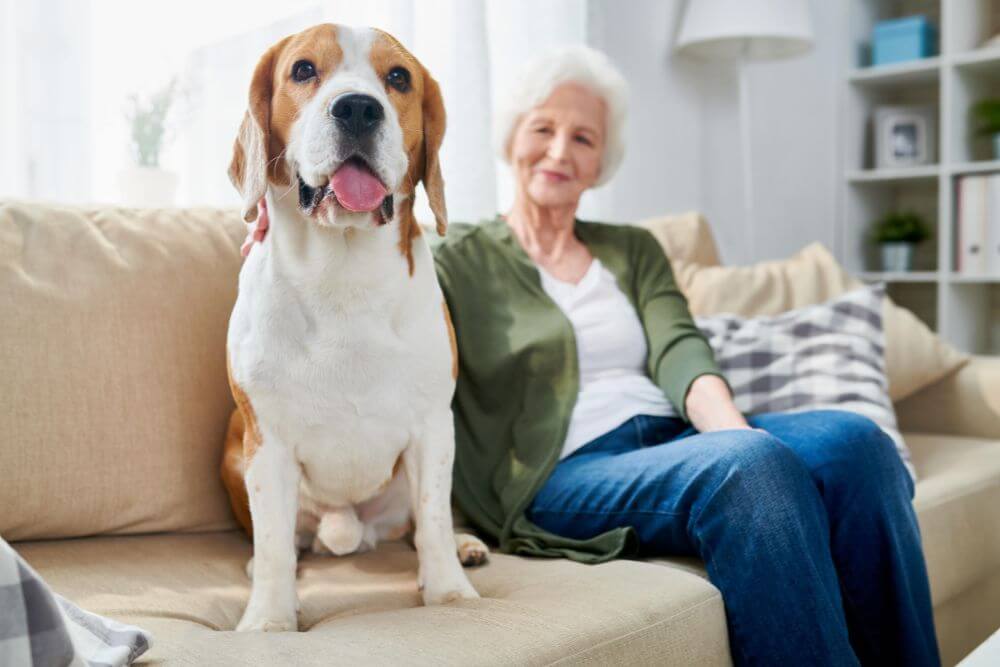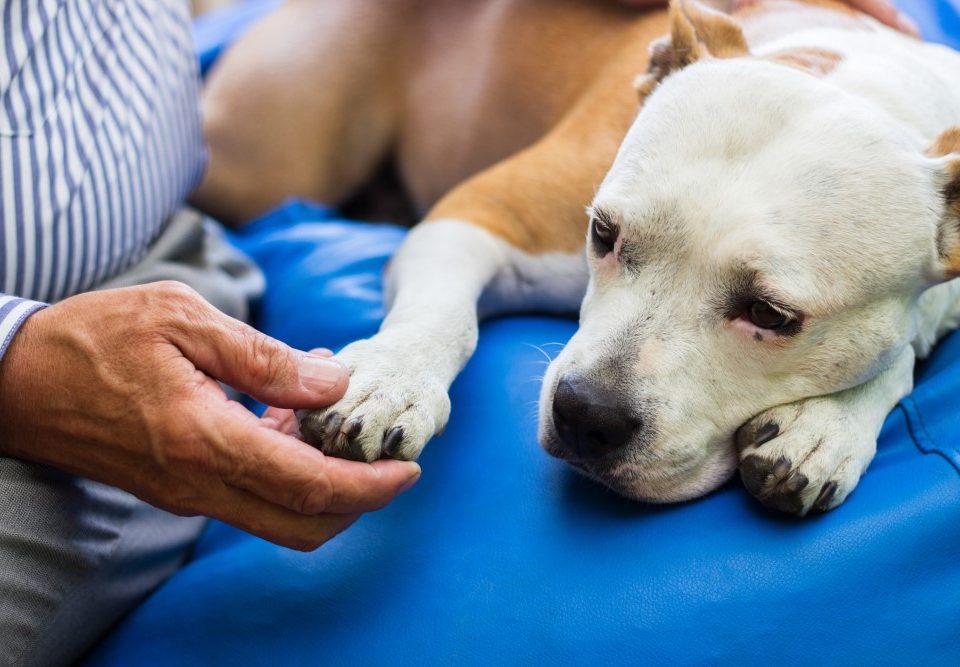
How Long Do Rabbits Live
December 7, 2023
Pancreatitis in Cats: Causes, Symptoms, Warning Signs
May 21, 2024
What is Syncope in dogs?
Yes, dogs can faint, just as people can. The actual process is the same – a short period of a loss of consciousness, often when there is a sudden but temporary reduction in blood supply to the brain. Once the dog regains consciousness, they will generally be back to normal nearly straight away.
Recognising Syncope symptoms in dogs
Often, there may not be any warning signs that your dog is about to faint. Sometimes, they may appear vacant or wobbly, before they collapse and go limp. They will be unconscious so will not respond to any stimuli such as touch or noise and they will generally be motionless and silent but still breathing. Occasionally, they can be rigid or vocalise and many will urinate or defaecate.
What is the difference between a seizure and syncope?
Although in both seizures and syncope, a dog will collapse suddenly, the two conditions are very different.
A true seizure is often accompanied by movement of the collapsed dog such as twitching, jerking or paddling. They will often chomp their jaws and salivate profusely. They are not truly conscious and will not be able to be ‘snapped out of it’, but they may well have their eyes open. Once the seizure has stopped, most dogs will take minutes or hours to be back to normal.
In contrast, as described above, syncope will present as a simple loss of consciousness with little or no body movements and the recovery is typically very rapid.
The causes of seizures are also very different to the causes of syncope so it’s vital to recognise the difference between the two. Owner descriptions can be very helpful, but video is incredibly useful to be able to show your vet an episode.
For more information about seizures in dogs, go to https://cloud9vets.co.uk/dog-seizures-symptoms-and-causes/
What causes syncope in dogs?
Syncope can have a number of causes, so a thorough evaluation and work up by your vet are advised. Physiological causes of syncope (i.e. those due to the normal functioning of the body) include heat and stress.
Medical reasons for a dog to suffer a syncopal episode include:
- Heart disease – problems with the heart can lead to a reduced blood flow to the brain, most commonly in cases of an arrhythmia where the heartbeat may be erratic, or abnormally slow (bradycardia).
- Low blood pressure – reduced circulating fluid volume, such as that which might be caused by dehydration e.g. due to vomiting or diarrhoea, diuretic drugs or blood loss, will lead to a low blood pressure which, just like in people, can cause syncope.
- Vasovagal syncope – this is the most common cause of syncope in people and is the result of a stimulation of the vagus nerve which causes a reflex bradycardia (low heart rate) and subsequent syncope. In dogs, the stimulation often comes from a fairly benign event such as coughing, toileting, pain, high emotional state, exercise, agitation or even the use of a slip-lead.
- Anaemia – lower number of red blood cells means reduced oxygen delivery to the brain.
- Chronic respiratory disease – again, can lead to reduced oxygen transport and abnormalities in blood pressure.
- Low blood glucose – often caused by over-exercise or other metabolic conditions, or to too much insulin being given to a diabetic dog.
Are there any breeds more prone to syncope?
Any dog can suffer an episode of syncope and many of the conditions listed above are simply more prevalent in older dogs of any breed.
However, some breeds may be more likely to suffer certain conditions earlier on in life and therefore may be more prone to syncope from an earlier age.
Sick sinus syndrome is a condition where the electrical firing of the heart goes awry, leading to episodes of either a very fast or very slow heart rate. It is more common in:
- Cocker spaniels
- Miniature schnauzers
- West Highland White Terriers
Ventricular arrhythmia is a condition where the heart rate becomes irregular (often for a prolonged period of time), due to a malfunction in the lower chambers of the heart (the ventricles). The breeds most likely to be diagnosed with this are:
- Boxers
- Dobermanns
- Bulldogs
- German Shepherds
Diagnosing syncope in dogs
A picture paints a thousand words and being able to observe a collapse episode, via a video recording, can greatly help your vet to start to diagnose the cause of the syncope.
Diagnosis always begins with a thorough clinical examination, even if the dog appears normal at the time of presentation. This can help to rule out other causes of collapse and to begin to look for clues, especially by listening to the heart and carrying out a neurological examination. A blood sample may be taken to look for clues such as anaemia, low blood glucose or high potassium (which may upset the heart rate). If it is thought that an abnormality with the heart could be playing a part in the syncope, further work up may be offered by way of an ECG to observe the heart rhythm or an echocardiogram to look at the function of the heart.
Other causes of collapse such as seizures or a neuromuscular disease will need to be considered during the work up and tested for accordingly.
How is syncope in dogs treated?
Treatment of syncope very much depends on the underlying cause. For physiological causes or possible vasovagal syncopal episodes, no specific treatment may be required other than some minor lifestyle changes.
If the cause is found to be related to the heart, then, in many cases, medications will be required to allow the heart to work as closely to normal as possible. In some more severe cases, especially in young dogs, surgery may be considered, such as installation of a pacemaker.
For other causes such as anaemia or low blood glucose, once further investigations have found the reason behind them and this is treated, the syncope should also resolve.
What is the prognosis, long term management and life expectancy?
Again, all these depend on the reason why the dog is suffering syncopal episodes. Most non-heart-related syncope is not life threatening. For those with heart disease, their life expectancy may be shortened, but with good management using medication, surgical intervention where needed, and regular monitoring, whilst minimising triggers such as mediating exercise, these cases can have a good quality of life. The more severe or more frequent the episodes of syncope, generally the poorer the prognosis for the dog.
When should gentle at-home euthanasia be considered?
No matter what the condition, euthanasia should always be considered when the pet starts to lose their quality of life. We have quality of life assessments available on our website to help owners objectively see when their pet may not be as happy as they once were, but don’t be afraid to discuss your pet’s condition with your vet.
For those cases of syncope that are caused by an underlying heart condition, care should be taken to look for signs of heart failure, such as a cough, lethargy, and difficulty breathing. Heart failure can often be medically managed for a period of time but eventually will progress and potentially cause real suffering to the animal, so regular monitoring is vital.
At-home euthanasia is likely to be more favourable for pets that have syncopal episodes as it will eliminate the need for a stressful vet visit and so reduce the chances of over-stimulation leading to an exacerbation of symptoms. Our vets and our care team will be happy to talk you through the decision making, the euthanasia options, euthanasia process and what will happen afterwards, in advance of the actual day itself, so if you have any questions, please get in contact with us.
FAQs
-
- Can syncope be prevented in dogs?
If the syncope is caused by an underlying health condition, then treatment or management of that condition will help to reduce or prevent the incidence of syncopal events. Otherwise, in order to prevent physiological or vasovagal syncope, ensure your dog drinks plenty of water on warm days or when exercising and minimise any stimuli such as sudden stress.
-
- How is syncope different from seizures in dogs?
To the observer, syncope and seizures will look very different – syncope is normally a flaccid collapse with minimal movement or sound; a seizure will typically involve twitching or shaking. A dog will recover from a syncopal episode usually within minutes, but recovery from a seizure can take hours.
-
- What are the emergency measures for syncopal episodes?
Don’t panic, make sure the dog is not at risk of harm and once recovered, seek veterinary advice. It can be very helpful for your vet if you can video the episode to aid with diagnosis.
Sources:
https://vcahospitals.com/know-your-pet/syncope-fainting-in-dogs
https://www.kingsdale.com/syncope-in-dogs-causes-and-treatment
https://www.petmd.com/dog/conditions/neurological/syncope-fainting-dogs



